#lok analysis
Explore tagged Tumblr posts
Text
Beifong headcanon:
Suyin knew that Toph had retired to the swamp (and possibly even visited her from time to time) but promised not to tell anyone her location. However, she told Lin once they reconciled. Opal also knew she was alive, but not exactly where. My reasoning for this is the mild reaction Lin and Opal had to Toph randomly showing up, as well as Lin's line, "You know, after Su and I patched things up, I thought, 'Maybe I should reach out to Mom'." Why would she say that if she didn't a) know she was alive and b) had some idea of where to find her? I like this explanation much better than what some people assume, which is that Toph abandoned everyone and made them think she was dead. I don't really understand why people want to think the worst of her. She had flaws but still had a big heart. I think she just got to a point where seismic sense made it too hard for her to live around other people.
#lok#legend of korra#lok analysis#beifongs#headcanon#lin beifong#suyin beifong#toph#toph beifong#opal beifong
73 notes
·
View notes
Text
Interesting, and true in a way
Generational spin-off media is like “okay, what would be the most in-character way for the previous show’s protagonist to comprehensively fail as a parent?”
49K notes
·
View notes
Text
This thing has been bothering me for years: The plot of Legend of Korra season 1 is completely backwards to what the worldbuilding is showing.
Republic City is built to accommodate machines, factories, and cars. The jobs we see non-benders having are in business, including Asami's dad who's a millionaire. The jobs we see benders having are factory workers and organized crime. With a few exceptions such as the metal-bending police unit and the ruling council.
It seems to me that benders are the ones who are oppressed in Republic City, at least materially. The presence of benders in police and government don't change it much since despite its name, Republic City in season 1 isn't a democracy. Benders being oppressed would also make sense as a continuation from ATLA, where we saw Earthbenders and Waterbenders being oppressed by the Fire Nation, and the United Republic is comprised of former Fire Nation colonies.
But the plot is saying that non-benders are oppressed. Amon and his Equalists are presented as having a point but going about it in the wrong way (plus Amon himself being a fraud).
It would've made more sense to be the other way around. The Avatar comic series Imbalance (which is otherwise pretty bad) actually does that right, with benders feeling threatened by the rise of technology in the pre-republic Republic City. LoK shows the end point of that process after decades of technological and societal evolution.
Either the Equalists should've been benders rising up against oppression. Or else if they're still non-benders, they should've been presented as a reactionary movement to benders reclaiming their rights, something akin to the real life KKK forming in reaction to black liberation in the US.
#writing#analysis#charles writes#the legend of korra#lok#korra#avatar#atla#avatar the last airbender#lok critical
354 notes
·
View notes
Text
hot take: the Avatar state (in its form through Aang) is very clearly a representation of the Great Equalizer (atom bomb) and getting rid of its absolute power was actually a good thing narratively, you guys just like the power fantasy/nostalgia too much.
like, he quite literally becomes an atom

“come on out little boy”
Little Boy was the name given to the bomb dropped on Hiroshima. the Fire Nation mirrors Imperial Japan. “No, I’m not gonna end it like this…”
“Now I am become death, destroyer of worlds” is a line Oppenheimer took from the Bhagavad Gita, a sacred text in Hinduism about the reincarnation of Vishnu, which is what the concept of the Avatar is based upon.
literally begging you guys to engage with analysis of the writing in atla through a historical context 😭
#atla#avatar the last airbender#aang#legend of korra#the legend of korra#lok#tlok#korra#atla meta#atla analysis#atla aang#aang meta#avatar aang#oppenheimer
439 notes
·
View notes
Text
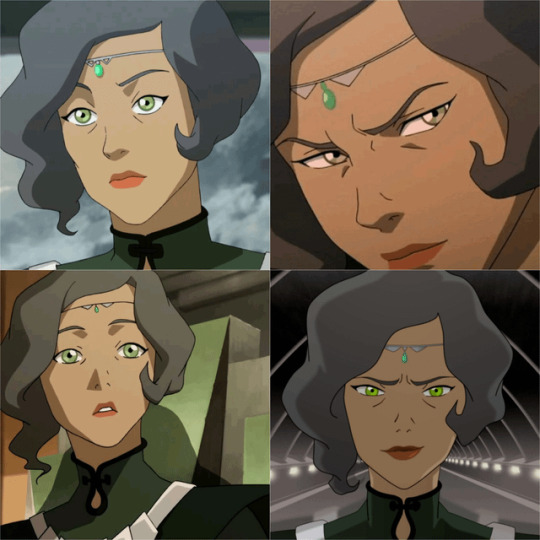
People always say they want complex characters. They ask for nuance, for gray areas, for emotional depth and realistic growth. But when a character starts feeling too real, so much so that they stop acting like someone in a story and start feeling like someone you could actually meet – that's when the discomfort kicks in. That's when admiration often turns into criticism. And very few in The Legend of Korra walks that tightrope quite like Suyin Beifong.
Su doesn’t follow the typical “lesson of the week” formula. She doesn’t get handed a tidy moment of reckoning, followed by an instant transformation. Her arc isn’t flashy or obvious. It’s slow, subtle, and sometimes contradictory. Just like real people. Because the truth is, most of us don’t change overnight. We grow a little here, slip back there. We learn something, but that doesn’t mean we always apply it in every situation. That’s Suyin in a nutshell.
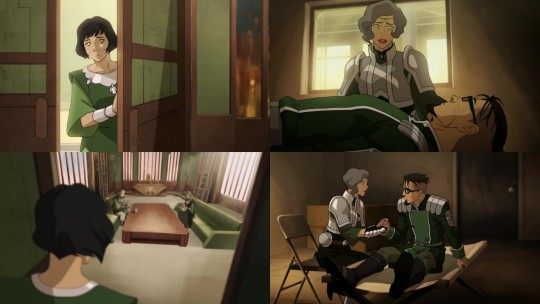
Look at how she changes as a mother. At first, she tries to micromanage Opal’s choices out of fear, mostly, and a need to protect her. But eventually, she lets Opal go and lets her live her life without trying to control her path. That’s a win. That’s real growth. But then Baatar Jr. betrays the family, and Su reacts by putting him under house arrest. It’s easy to point at that and call it hypocrisy, but that misses the bigger picture. Her deepest fears for her kids came true with Baatar, and so, of course, she tries to regain some kind of control in the aftermath. And yet, she doesn’t try to rope Opal back in. She lets her stay free. That shows her earlier growth wasn’t erased, just complicated by pain.
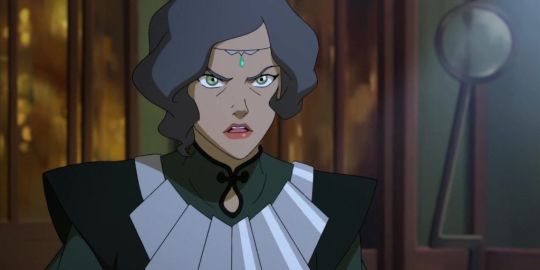
This is the part people tend to ignore. They rush to call her a hypocrite without stopping to think about what hypocrisy really is. People are full of contradictions. We want conflicting things. We act on emotion. We stumble. We grow unevenly. No one is morally consistent all the time. Su isn’t some moral failure she’s just human. And that’s what unsettles people. They want characters who get what’s coming to them or learn the “right” lesson. But Su doesn’t fit into that framework. She just keeps going, flaws and all.
That’s also what makes her so compelling. She’s not a straightforward hero or a satisfying villain. She’s a complicated woman trying to balance power, family, control, and identity in ways that are messy and real. When people critique her, it’s often not because she doesn’t make sense, but because she makes too much sense.
She’s too familiar. Too human.
Everyone says they want nuanced characters... until they’re faced with someone like Suyin. Someone who holds up a mirror. And when that reflection hits a little too close to home, people tend to look away. But it’s in that raw honesty where her character really shines.
#legend of korra#suyin beifong#avatar the last airbender#lok#pro suyin beifong#we love and support suyin#we asked for a realistic female character#and got really upset we got one#nuance is important#nuance is also dead#fandom be normal about complex female characters challenge (impossible)#critical thinking#moral complexity#let's normalize steady and imperfect growth media#earth kingdom#zaofu#motherhood#opal beifong#baatar jr#such an underrated character#character arcs#character analysis#character development
91 notes
·
View notes
Text
"zukos character arc is best-
"no aangs flirting skills are-"
"You forgot sokkas hair-"
YALL FORGOT KORRA
SHE WENT FROM THIS
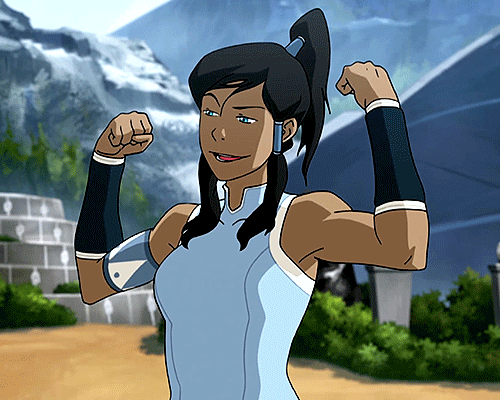
TO THIS

AND STILL GIRLBOSSED HER WYA THROUGH EVERYTHING WHILE ALSO FINDING LOVE AND GAINING BACK THAT MUSCLE!
she also showed a lot of people, like me, that mental health recovery isn't linear. like, girl, that show has problems BUT DAMN IT IF IT ISNT BETTER THAN MoST THINGS YOU SEE
#lok#avatar korra#avatar legend of korra#legend of korra#korra#korra analysis#guys we take advantage of the fact that she comes from an amazing fandom#like she is such a good character#and a great show#and yall trash on it#(im not saying it shouldn’t take criticism)#yall need to chill with the korra hate#you're probably jealous you can pull an asami
475 notes
·
View notes
Text
I will NOT have Caitvi shippers talk about bad writing and slander Korrasami in the 10th anniversary.
I talked about this in another post: https://kaoskuantico.tumblr.com/post/768696997574246400/i-criticize-the-caitvis-writing-because-they
Respect your elders, learn some history. When Korrasami got canon, gay marriage wasn't legal in all states in the USA. Nick didn't even want a woman Avatar as protagonist, at first they only let them have the first season, then the second, and finally the third and fourth got allowed at the same time.
In the fourth season the animation studio had to make that weird episode with used scenes because it was either that, or firing a LOT of their animators.
They removed tlok from tv in books 3 and 4 and could only be watched online.
Korra was a huge representation for mental health, besides being bisexual (yes, BISEXUAL) and from inuit ancestry.
Every time a new wlw relationship gets canon, instead of celebrating we have another ship, some people decide to shit on previous ships on media.
I won't compare Caitvi and Korrasami, they're too different and it will only create fights and unnecessary gaps in the fandoms. Breaking the cycle of violence, I guess.
So I just ask for Caitvi shippers to celebrate their own ship and let Korrasami alone. Without Korrasami, I doubt we'd have the Caitvi's sex scene.
#media analysis#korra#avatar korra#tlok#lok#korrasami#asami sato#legend of korra#the legend of korra#caitvi#arcane caitvi
63 notes
·
View notes
Text
⚣ ATLA/LOK: The Four Nations & Homosexuality ☀️
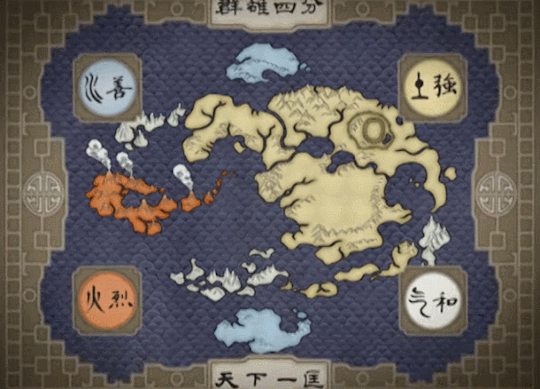
I'm planning to write for my favorite characters from the Avatar universe again. Any OGs from my first account know I started posting content about ATLA and LOK, specifically Bolin and Mako, WAAAY before I started posting DC and Marvel content among others.
So I wanted to talk about something I found really interesting about homosexuality within the four nations and their attitudes towards it regarding acceptance and whether they embraced or turned away from it. And since we are soon getting a new Earth Avatar series, we might as well start with the Earth Kingdom.
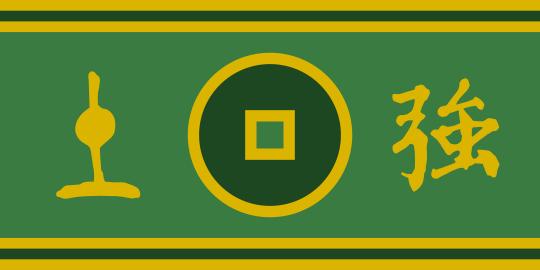
EARTH KINGDOM
First, let's consider the element of the nation itself and what it symbolizes.
Earth is not just the element of strength, but also the element of endurance and rigidity. In simple terms, it's a tough and stubborn element.
Also, Earth is a hybrid element, meaning it can be used in defensive and offensive manners easily.
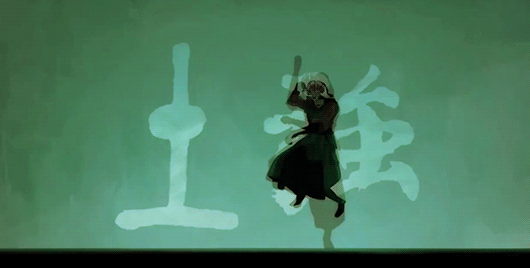
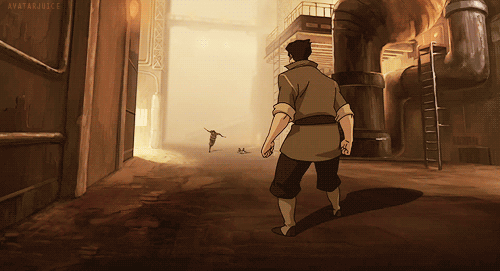
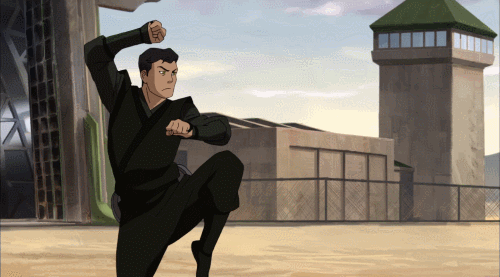

Concerning its nation, it can be shown how citizens of the Earth Kingdom would more than likely be very conservative and adverse to any change or diverting from societal standards in the norm.
They're stubborn and stuck in their ways, so they may not react the most positively to displays of affection between same-sex couples. But, it can work in both ways.
As mentioned, Earth-benders and citizens, in general, tend to be very stuck in their beliefs, meaning if one were to have a more liberal position on the matter of social and romantic relationships, they would be just as defensive and stubborn in that belief as someone more conservative and traditional.
This goes back to my saying that Earth itself is a hybrid element. A mix of defensive and offensive tactics. Just as much as people way attempt to push their beliefs onto others, they're just as quick to defend their beliefs and ideals.
I'd also argue region/location within the Earth Kingdom is a major factor. If we're talking places like small villages or cities like Omashu in the animated version, you may be met with pushback and intolerance. But, places like Kyoshi Island where its founder was a lesbian so likely had very liberal beliefs concerning such topics. Also Omashu from the live-action since that version portrays Oma & Shu as a lesbian couple, and even Ba Sing Se since big cities are proven to attract a more liberal-leaning population.
But, interestingly enough, in the comics, it's stated that the Earth Kingdom is the slowest to accept change, and their default is still heterosexuality. Obviously, this comes from the rigidness and stubbornness of the Earth element itself. So even if Ba Sing Se has a more 'liberal' or rather "diverse" crowd, doesn't mean that crowd is automatically open to homosexuality. Ideally, the only known place in the Earth Kingdom where you could experience the most acceptance and grace from others would be Kyoshi Island
In summary, on a scale of 1 to 10, 10 being the most accepting & embracing of homosexual relationships and 1 being the opposite, I originally was going to give the Earth Kingdom a 5, but remembering how it's stated in the comics that they are the slowest to accept change which checks out, they got bumped down to a 2.
It is a very big nation and thus has the potential to plant different seeds of belief and opinion, however, it's clear in the show how rigid and otherwise, unshakeable denizens of the Earth Kingdom can be. They have their beliefs, and they strongly stick to them.
Even with someone like Avatar Kyoshi who had to go and make a whole separate Island where she and her people could live in peace and prosperity without certain influences affecting them, they still have yet to come around to the idea that other people live with different interests and beliefs, and that there is truly no 'default' for even one person.
Acceptance Rating: 2/10
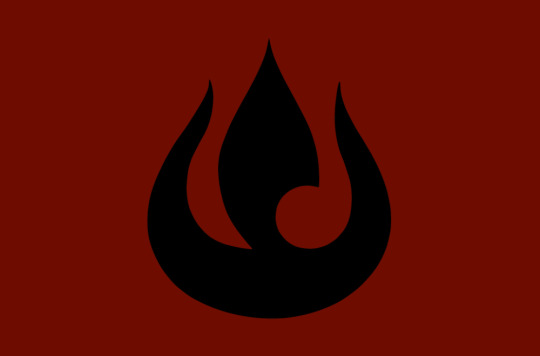
FIRE NATION
Starting with a focus on the element itself again, fire is the element of power, as described by Iroh. It can burn things in its path, but can also give life. In simple terms, it's an element of strong will and desire to expand and consume, literally and metaphorically.
Fire is also mainly an offensive element, with the capability of modifying certain offensive moves into defensive ones.
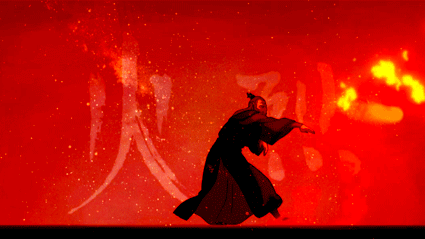
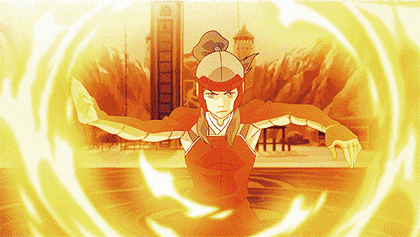
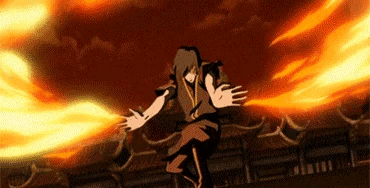
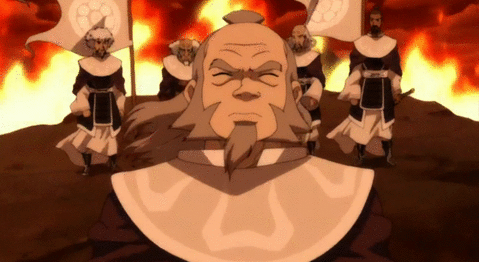
Its nation's citizens and benders heavily share these traits with their element. They tend to be willful and proud, and while that doesn't necessarily equal being close-minded, pride can very well lead to stubbornness.
This is evidenced strongly by the political government of the Fire Nation, with its monarchy power having complete and total influence and control over its citizen's lifestyles and choices. If one Fire Lord feels strongly about something and makes it into law, another Fire Lord can come two generations later and reverse and change it.
This is shown in the nation's history, where homosexuality was actually tolerated (I hate using that word) in the Fire Nation for a long time before Fire Daddy, ahem, I mean Fire Lord Sozin's rule. It was during his reign as Fire Lord that Sozin outlawed same-sex relationships and marriages among the Fire Nation and its citizens.
Some speculate it was due to the clear pressure he faced being the sole heir to the throne since his sister was born a non-bender, something that was frowned upon in the royal family. A potential heir to the Fire throne had to be a firebender, with no exceptions. Therefore, Princess Zeisan was allowed more freedom and control in her life than he was, as evidenced by her embracing Air Nomad culture and being confirmed as a lesbian.
It was common knowledge that Sozin and Zeisan had a very antagonistic and tense relationship with each other, despite them being siblings. They were pitted against each other from a young age which caused a rivalry between them. So, it's completely possible to speculate that Sozin implemented the law to spite his sister who fell in love with Sister Rioshon, an Air Nun.
it's also completely possible to theorize that Sozin harbored homosexual tendencies and feelings himself, especially towards his best friend, Roku we all know was the Fire Avatar before Aang. Again, his being a royal prince and next in line for the throne threw a wrench in this since Sozin was expected to marry a woman and produce an heir. So his potential feelings for his best friend could never be explored due to his duties and responsibilities to his nation.
So since Sozin couldn't have what or who he truly wanted, no one could, and thus, same-sex love and marriage were banned. And that didn't change no matter where you went in the nation unlike the Earth Kingdom where you could go from village to village and city to city and the rules would be completely different depending on where you were.
Again, fire is the element of power and will. And if it was the will of the Fire Lord to ban same-sex relationships in the nation entirely, then everyone had to fall in line. Meaning the door was opened for more conservative and traditionalist views to be voiced in opposition to same-sex relationships.
While some may have had differing beliefs and ideals, they more than likely had to keep it to themselves, especially among the nobility. This can lead to harboring feelings of anger and resentment, rather than love and acceptance, causing people to react harshly to any displays of such affection and behavior, just like Sozin.
As I said, fire as an element itself is primarily offensive in nature. Reflecting on its people, and especially its governing body, this is clearly shown by the notion that one person's opinion and belief can be pushed onto everyone around him if he or she so decrees it.
With that, the Fire Nation gets a 3/10 on the scale. Again, in the past, they were at minimum tolerant of it. which is not much if we're being honest. Tolerant actually is kind of insulting. But, after Sozin's rule, that tolerance more than likely dwindled and hasn't improved much following his reign as far as we know.
I'd like to think that Zuko as the Fire Lord, having seen much of the world and all its different dimensions and lifestyles people have lived, he'd at some point in his reign reverse the ruling, but that's a far-fetched hope knowing these writers and creators (no shade...mostly).
Acceptance Rating: 3/10
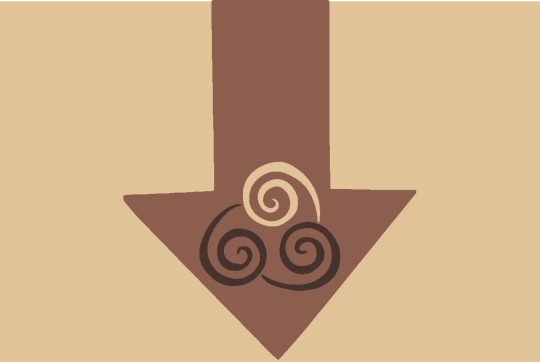
AIR NOMADS
Air is the element of freedom. It's flexible and lacks restriction, moving in any direction it desires. And because of its lack of constraint, it becomes easily adaptable in any scenario, whether it's evasion, offense, defense, etc.
However, the element of air is primarily and almost purely used as a defensive and evasive practice among its population, due to its nation as a whole choosing to live as pacifists. But, do not be misled. As mentioned, air as an element can be just as powerful offensively as it is defense-wise.
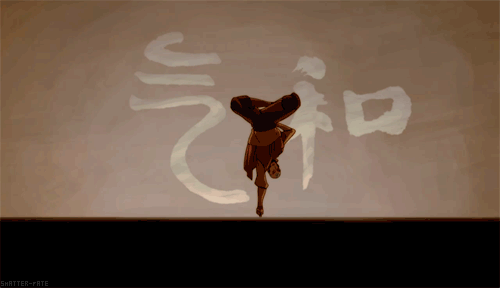

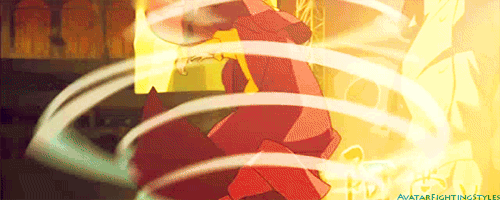
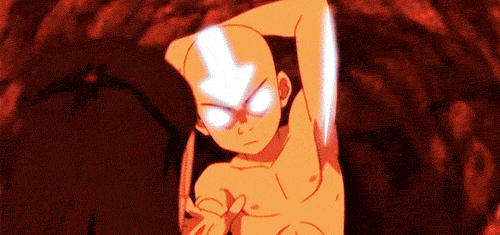
Just as their element, the benders of the Air Temples were very open and flexible people. As monks and nomads, they chose to forego many earthly and physical connections, seeking spiritual enlightenment. Because of this, there were never any non-benders in the Air Nomads.
Any child born from an Airbender was an Airbender themselves. Also, due to their style of life and spirituality, they were very adaptive to any situation they were placed in, making them very open to any and all change around them.
While they lived by the teachings of the monks and masters of the Air Nomads, they lived freely and openly, just like their element. The most restriction they had was as children or masters/monks that lived at the temples, males and females were not allowed to live together in the same space.
I'm not sure if this applies to temples as a whole as I've seen conflicting information. Some say the rule applies to temples as a whole, which would mean the Northern and Southern Temples were only inhabited by male Airbenders, and the respecting Eastern and Western temples were inhabited by female Airbenders.
But, I do remember a specific scene from Avatar, during the 2nd season when Appa was lost, and he had a memory of when he was a baby bison, and he and Aang met for the first time. I remember the monk facilitating this was a female Airbender, so that's why I'm not exactly sure what is concrete.
But, it does make sense as in many of Aang's flashbacks to his time at the Southern Air Temple, we mainly only ever saw male Airbenders. Thus, many have speculated that this specific rule would inadvertently encourage exploration and curiosity for these young Airbenders regarding their sexuality as they matured and eventually left the temples as adults and master Airbenders.
Also, on this, no child from the Air Temples was raised by their parents. They were only raised by the monks, enforcing that common belief and practice they all had. While they of course had their own identities, they were all taught the same thing from an early age, if an Adult Airbender met and had a child with someone from a different nation, that child likely being an Airbender would be sent to the Air temples to be raised by the monks.
All that to say, Airbenders would be the exact opposite of conservative. They technically wouldn't even be liberal since, again, they detach themselves from earthly limitations in favor of a higher spirituality.
So, since they don't subscribe to earthly practices or beliefs, they would be the most accepting nation of homosexuality and same-sex relationships. It's not in their nature or belief to judge others either so they wouldn't show any hostility or intolerance to LGBTQ+ people and relationships.
Just like their element, they practice freedom and adaptability to the world around them. And just as air is primarily used in defensive manners, they still will defend their beliefs and practices, they just avoid direct confrontation, preferring evasive maneuvers.
Just a quick note, the Air Nomads are what I like to think of as the example of how this world should have been. I read another column that detailed how the creators of the show ultimately created institutionalized homophobia because they couldn't imagine a world without it, and that's in large part due to the heavy influence of Western, colonial, Christian, and to be quite frank, European imperialism on the show's writing.
It's a fact that's becoming increasingly more well-known. Before European and Christian colonization/imperialism, many cultures and communities were not just accepting of same-sex relationships and LGBTQ+ identities, they embraced it! While there were definitely pedophilic relationships that were wrong and grotesque no matter what time period it was, same-sex relationships were just as normal as opposite-sex ones. There was no "default."
So in simple terms, the Air Nomads accept and embrace everyone, no matter who they are or how they live. As long as they don’t wrong and harm others, and even then, they see everyone as equal and deserving of respect and love. And that's what our society should be based on. Of course, they were killed off in an entire genocide, which, say what you will and think what you think, but the one culture that accepts and loves everyone as they are being killed off...ironic, don't ya think?
Acceptance Rating: 10/10
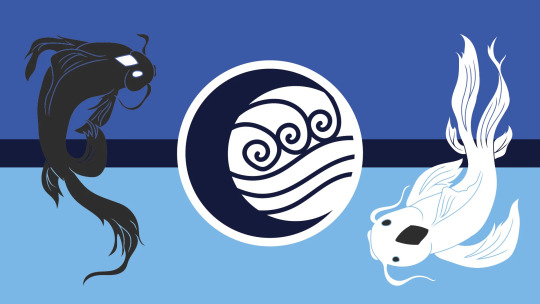
WATER TRIBES
Finally, water is the element of change. Like air, it adapts to its circumstances, but more fluidly and gracefully. Yet, unlike air, it relies on the flow of energy, turning its defense into an offense and back. In whatever scenario that sees fit, a Waterbender can change their liquid offense into a solid defense, or turn a solid offense into a gas defense.
This clearly makes the water an element suitable for either an offensive or defensive strategy. Its unique ability to change its form to fit its circumstances gives its user an extreme advantage in combat or any other risky scenario.
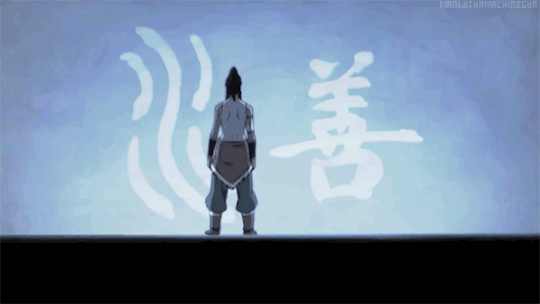
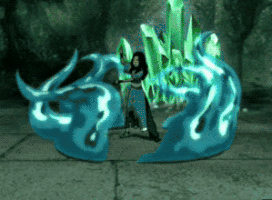
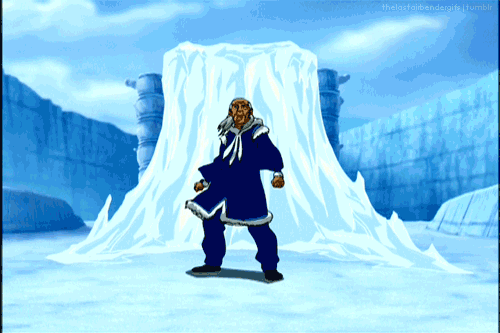
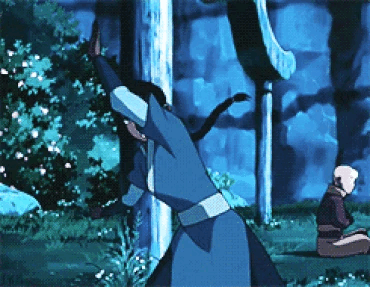
Now, even with this in mind, ironically enough, the people of the Water Tribe are not the most in sync with their element as far as when it comes to living standards.
While yes, in combat, they adapt and adjust accordingly to their needs and goals in the fight, in regular practice, they're more conservative and less open to change than you would initially believe.
Also, as confirmed in the LOK comics, while the Water Tribes are not openly homophobic, they are still lacking in accepting and embracing the concept that there is not one rule that applies to all when it comes to who they love. Which, when you think about it, checks out.
The Northern Tribe operated heavily off a patriarchal society as we saw in the first season, and it took Paku nearly getting his ass whooped by a teenage girl who was the grand-daughter of the woman he loved but refused to wed since it was arranged for them to start to change their ways. Even if the Southern Tribe was a bit ahead of their Northern counterpart in this sense, they still suffered from the restricting roles they placed on themselves concerning gender.
Giving props to Fire Nation and Air Nomads, they never had restrictive rules on who could fight in battle, even if the Nomads as mentioned tended to avoid conflict. However, the Earth Kingdom and Water Tribes both practiced and thus, were limited by their rules that men were only allowed to serve in the army and in the guard.
Of course, we've already discussed the Earth Kingdom is the slowest to accept change, but for the Water Tribes, this is a bit unnatural, and if this is how they act regarding gender, it says a lot about how they would react when it comes to same-sex relationships.
So, it's understandable why Kya advises Korra and Asami to keep their relationship to themselves. But, I personally don't believe they should. Creating change means people are going to be uncomfortable. Oh well, boo-hoo, they'll get over it.
But, this does at least check out with the hybrid offense/defense nature of water bending. People of the Water Tribe will stand their ground and defend what they choose to believe in and love. And while they may not openly go out of their way to push their beliefs onto others like those in the Fire Nation, it doesn't mean they don't still have ways have doing so. Like water, I imagine their approach to such a subject can vary.
With that, Water Tribes get a 2.5/10. They're ahead of the Earth Kingdom in the sense that they've realized excluding women from fighting hurts them more than it helps them. Also, it's highly plausible that if a woman can learn how to fight, a man can learn how to heal, but I digress. However, they're still lower than the Fire Nation since this is less of a government-forced ideology and more of a societal norm they place on themselves.
Acceptance Rating: 2.5/10
I like doing analysis like this. If anyone thinks of other topics to discuss and do a deep dive into, send it in my asks!
#solar-wing ☀️#☀️🪽.random#☀️🪽.avatarposts#☀️🪽.analysis#☀️🪽.txt#lesbian#gay#bisexual#transgender#lgbt#non binary#avatar the last airbender#legend of korra#atla#lok#water tribe#earth kingdom#fire nation#air nomads#male x male#female x female#mlm#wlw#bxb#gxg#fanfiction
127 notes
·
View notes
Note
Hi hello, feel free to ignore this ask if you're sick of people bugging you about Su's relationship with Lin.
Why do you think Su said that shit that was like "No wonder why Tenzin left you... [you're just a sad old woman (or some shit I do not remember exactly what was said but girl!! shots fired!!)]"
Would love to hear your take on what was going on in Su's mind there if you're up for it.
Honestly? Because she probably knew it would hurt Lin's feelings. Look, I defend Suyin when I can, but this was mean as shit and it was intended as such.
I do think this is a boling point for Suyin as much as it is Lin. Although Lin has reason to be angry with Suyin, and I'm nor expecting her to be warm and friendly, we can't deny that she has been... well, a bit of an asshole throughout her stay in Zaofu.

(Side note- I do love Lin growling when she's upset because my dad also does that and now I find middle aged people -my dad is not middle aged but lets pretend so we don't hurt his feelings- growling in annoyance normal and endearing)
She's been consistently antagonising Suyin with small jabs, which, I believe, especially the one about Suyin's motherhood were absolutely out of line.
Lin: Five kids. What a nightmare. Suyin: No, no. My children are a blessing. Lin: Yeah, mom used to say that too, but she never meant it.
Like, m'am, in front of said kids. Like I can easily see this hurting Suyin's feelings, with how strongly she is attached to her family. And then Lin drives Suyin's daughter to tears, which probably didn't smooth the situation over.

Suyin: I know she has a problem with me, but she had no right to yell at Opal last night.
And, mind you, once again, before people flood my inbox again, Lin isn't entirely in the wrong here. But she's also being a dick, and Su has been mainly allowing her to rage.
This is not to say Su has been completely rolling over for Lin, but I think it's more that she's been allowing Lin to take her anger out on her, perhaps hoping that is what Lin needs. As that is also her perogative when Lin attacks her.
Suyin: You've got it out of your system? Lin: [Angrily.] Not quite yet!
Maybe this is a pattern of behaviour from when they were younger that they have fallen into (since it did kinda work in the end lol) . So, Suyin allows Lin to lash out at her, even if some comments could get under her skin.
I think Lin yelling at Opal changes the situation for Suyin a bit, since now her child, who was just trying to be nice, is collateral in this sisterly beef. Suyin's tone is also much more stern and angered when talking about Opal getting yelled at.
So, I think the stage is set for Su to lash back out at Lin. And so next time they speak, Su says what she says. Especially that it was a tense conversation, and Suyin truly does appear hurt by Lin's constant rejection of peace. She's hurt that Lin pushed her away for almost 30 years, which, while it was Lin's right to do so, doesn't negate the fact that Su is stated to have reached out multiple times and tried to work things out with Lin. However, Lin is still very weirdly obsessed with the idea that Suyin hasn't changed at all.
Lin: You think that just because you live in a big, fancy house, and have a chef who cooks you fancy food, that you're a different person? Maybe you could fool everyone else, but you can't fool me. I see right through you. Suyin : You know what, Lin? You're the one who hasn't changed. You're still a bitter loner who only cares about herself. No wonder Tenzin ended things with you years ago.
And this is the proverbial straw that broke the camels back, because say what you want about Su, but she has changed and grown since her and Lin last saw each other. And, honestly, I think Lin's constant assuredness that Su hasn't changed stems from Lin's crux character flaw of stagnating and rejecting change. It's not that Su hasn't changed, it's the fact that the way Lin perc8eves her has not changed, which is, of course, one and the same to Lin.
Suyin's words also call back to the same phrasing Korra used in Old Wounds, and it drives home the message the writers want us to see- about the fact that Lin's coping mechanisms arr not healthy for her or those around her.

I love the Zaofu arc for Lin, because it's one of the only times her stagnation and stubborness get challenged. Are the other characters being mean to her? Yes, but mainly because she was being mean too. It's the most aggressive intervention for one of the most stubborn characters of the show, and I love it. I wish that there was more development around Lin, because yeah, she is a loner (nothing wrong with being introverted, but Lin seems to actively isolate herself) ,yeah, she is bitter and she's taking it out on herself and on others, and it's not healthy.
Also, side note, we need to talk about Lin's weird paranoia thing around Su. Like the whole "Maybe you could fool everyone else, but you can't fool me." and being hell bent on the idea that Su is working with the Red Lotus. Like Lin is there in the corner with her tin hat on waiting for Suyin to be the show's next twist villain or something lol
#couldn't stop myself from doing the lil Lin character analysis sorry lol#lin at the first family dinner she's ever been to: hi kids im your aunt lin and your mother is lying about loving you#beifong brainrot#i do like how everyone immediately put their foot down when lin yelled at opal like the entire cast decided to defend that cinammon roll#lin beifong#suyin beifong#opal beifong#korra#legend of korra#avatar#tlok#the legend of korra#avatar the legend of korra#atlok#lok
28 notes
·
View notes
Note
I was really interested to hear you bring up colorism when talking about Korra. Something that I've noticed (and other poc/black women have noticed) is the stereotypical treatment that Korra/Asami get in the show.
Korra is barefoot, beat up, and rarely treated with any dignity by the narrative. Her design in the later seasons became a caricature, she was stripped of her soft/feminine features.
Yet Asami is constantly shown an innocent victim, given slow motion cringe hairflips with full makeup, somehow a successful ceo despite war profiteering/never struggling, is given numerous abilities for no reason other than to make her "look cool"
Even that line with Makos grandmother complimenting one for being beautiful and the other for being so muscular? Like, what was the point?
Doesn't it seem a little sus, that two men did this?
I could go on for hours talking about the unfair treatment of Korra through the show, and that Bryke are in fact her first haters.
Never thought of the comparison you made, but it does makes sense so I'm glad you shared them! Even if Korra is the heroine, so obviously involved in every fights while she dedicated her whole life into physical training and bending elements ect... it seems like it's a good excuse to portray her like that right? But the there's the problem you perfectly showcased, the comparison to Asami.
Personally I'll showcase through the romance and social part of the show and the fandom interpretation since that's what I observed the most.
People casually like to deny Makorra and Mako's sincere love for Korra, even if it's messy it's still factual and not that hard to understand especially knowing it's implied until the end he love her (and prob still). And outside of shipping preferences, it wouldn't influence or threaten the actual main couple to knowledge Mako's love for Korra, so why not?
The thing is, the fandom is unable to accept Asami as someone unloved.
Asami did the first moves and desperately seeked for Mako's affection but still she got ditched multiple times bc Mako's romantic dilemma in the first two books was showcasing how he only had genuine feelings for Korra and choosing her was about him giving into his feelings, that even if his indecisive he will always choose his heart and go back to her again and again.
but somehow people can't accept to see Asami as someone unloved, someone who's a second choice, Especially, they can't accept that Mako prefer the "buff" or "tomboy" like brown girl, over the conventionally pretty fair skinned asian girl, who shares the same heritage as him, bc that's what they actually think themselves, an ideology deep rotten in colorism.
And with that twist at the end with the girls being together, like you said Korra slowly got ridden of her feminine features so Asami can still showcased as that conventionally pretty girl besides her partner, but in that case, even Asami got turned into a caricature, ending up as a damsel in distress the main character has to save again and again which something that never happened beforehand... so why now?
But that's another conversation on what happens when you let two cishets white mens writing a young wlw mixed couple of color. (and obviously it's a bad idea lmao)
Unfortunately these critics are never heard since colorism is a normalised issue, and tbh I wouldn't even take time to explain it but I'm always glad to find concerned people who will actually get it 🙏🏽
#anti bryke#the legend of korra#lok takes#lok#mako#korra#tlok#avatar#colorism#analysis#avatar korra#anti asami
32 notes
·
View notes
Text
I love headcanoning Lin with rough edges, even while she's healing and building healthy relationships post-canon. I love to see realistic growth with constant backslides. She's a certified grump and while, yes, she was wronged, she's also not blameless.
She held a grudge for thirty years, despite ample opportunities to hash things out. Her mom was distant and didn't give her the attention/approval she wanted. Her sister was a teenage brat who got caught up with the wrong crowd and made a big mistake. Neither are unforgivable crimes. In fact, those are pretty common sources of family drama.
Lin pushed everyone away for decades because she's stubborn as hell (affectionate) and refused to acknowledge her own flaws. She accused Suyin of being exactly the same as her teenage self (objectively false) because Lin herself wasn't willing to grow and bloom. She was just angry all the time. Maybe even angry at herself, deep down, for not even giving her family the chance to make amends.
What an amazing, complex character. I adore her. I love her rough edges and her unshakable sense of justice and her self-sacrificing nature. I love Toph and Suyin, too. Flawed people, tied to each other with invisible strings, pushing and pulling because they can't get on the same page. They're too different and too alike at the same time.
98 notes
·
View notes
Text
Fandom is weirdly incurious.
That seems to be a fandom phenomenon in where the CinemaSins mode of thinking limits the imagination. As in everything in the fantasy world must be detailed and explained to us with little ambiguity to it. Otherwise a fan’s inference is just meaningless.
Hypocritically these same viewers would call out the show for any such exposition so clunky and obvious in intention to educate the viewers.
See… one of the things I liked about The Legend of Korra fandom back when the show was airing (despite Nick’s best efforts) was that fans thrived with making analytical text posts out of the blanks the show left. The Fridge Brilliance page for the show could be overblown but it was clear that the staff wanted to invite viewers to take a closer look.
For every ATLA purist, there were those who read Korra’s Season 1 arc as opening her Chakras and culminating in achieving the Avatar State. Many who saw Mako as a person who did hurt others but without realizing and honestly being more of a dork at the end of the day.
Basically they used their imagination. Headcanons and theories are the backbone of fandom. Some are weird ideas while others take stock of what the show presents us and make reasonable deductions.
Yet for the other side of the coin, it’s always “Here’s how it doesn’t work for me” yet they hesitate to ask, “Why does this hit the spot for others?” There’s a lack of curiosity to look outside their bubble despite insisting that they’re not closed minded.
Like CinemaWins released his video on The Rise of Skywalker, a unilaterally hated movie, and explained why he liked it. He also explained his understanding of why others didn’t like it and it was so much better than the millionth video of somebody thrashing it.
Even if you don’t like something, that doesn’t mean opposite perspectives aren’t valuable. Craftsdwarf on YouTube has videos exploring Sword Art Online and takes it seriously compared to a lot of the hatedom that formed around it.
I don’t fully agree with them myself but it was so much more refreshing than the dime a dozen hate pieces. There’s a market for positive stuff out there but negativity, by its more unfiltered nature, draws more attention by “saying the quiet part outloud.”
I highly recommend Zoe Bee's eye opening video essay: "YouTube and the Death of Media Literacy." It touches around the thirty minute mark how some ambiguity, blank spaces if you will, in a story isn't a bad thing actually.
#korra#legend of korra#nickelodeon#miraculous ladybug#ladybug#miraculous#fandom#rwby#fndm#lok#the legend of korra#avatar the legend of korra#avatar the last airbender#avatar#media literacy#media analysis#nicktoons#netflix#disney#subtlety#writing#storytelling#anime
27 notes
·
View notes
Text
i've had the pleasure of playing Legacy of Kain Soul Reaver's remaster, and as one of the most foundational games for me overall, its given me time to think about stuff. its more or less how the game works; its fundamentally an exploration/puzzle solving platformer with action elements, with the best example being that most of Raziel's upgrades aren't making him stronger but allow him to traverse in new ways, and its gotten me to think about something I've had on my mind ever since i played Soul Reaver 2 back when it released in 2001 (i think):
the exact circumstances of Raziel's rebirth as a wraith, and exactly what's going on with him, is incredibly murky because the only real source Raziel has to go on is enormously suspect and explicitly lies all the time to your face, and that's the Elder God.
The Elder God claims to have spared Raziel from complete dissolution and acts as a benefactor, but Raziel is shown to be deeply suspicious of him around Soul Reaver 2. At first I thought that was a shocking swerve back in the day because the Elder God had always been helpful by the standards of the series, but it bears reminding that Soul Reaver wasn't able to do everything originally planned for it, with many of the unfinished aspects showing up in SR2 and Defiance in some respects (and also i recommend looking up the cut content, it is very cool); crucially, the ending would have had Raziel darkly asking the Elder God if he actually DID save Raziel and remake him as a wraith, or if Raziel was altered by unknown circumstances and the Elder God just took credit for it to manipulate Raziel for its own purposes.
Tellingly, the Elder God simply laughs, and ceases to communicate with him. Afterwards, Raziel would go back in time in an attempt to correct his course. This suggests that the Elder God was always meant to be ambigious and untrustworthy, and almost certainly did NOT have any involvement with whatever Raziel has become.
And the thing about it, the very thing that kept bugging me as I played through the game as a kid and now as an adult, is that Raziel is hardly unique, as a vampire wraith.
They're a common enemy in-game. When a vampire is killed, but their soul is not consumed by Raziel, they become a wraith that floats around the Spectral Realm as probably the most dangerous recurring enemy. As long as their body is intact, the vampire wraith can always return to that body, becoming far more powerful; among other things, gaining the ability to auto-drain Raziel's health, implicitly devouring his soul much as he does to them.
Exactly as Raziel operates.
This is more explicit with the most powerful of the vampire bosses, Raziel's brother Dumah, who alongside the second eldest (Turiel), were the ones who executed Raziel. Dumah has been killed by human hunters and impaled by spears, but his spirit is still around, and once those spears are removed, he is a nigh-unstoppable juggernaut that requires environmental tricks to kill for good. Possessing his body, becoming stronger than before, and vampire wraiths apparently being a fairly natural power for vampires to manifest if killed but not permanently destroyed, all points to Raziel's nature as a wraith not actually being that unique.
So what's different about him to being a walking paradox who, alone of all beings, has free will?
The setting establishes that older vampires are more powerful; Dumah is incredibly strong because his spirit has endured the Spectral Realm for so long. Most vampire enemies vary from needing a few hits to take down, with fledgelings far weaker, and this implicitly shows their toughness because the HUMAN enemies you fight will immediately die from a single hit from the Soul Reaver, or at least two melee weapon hits. It's not that vampires are weak, they're really quite strong, and Raziel is no exception. Raziel, furthermore, was the eldest and most powerful of Kain's lieutenants, and he was submerged in the Spectral Realm for a VERY long time. The specifics are unclear, but it has at the very least been centuries, enough that the landscape is rather different and vampires have mutated into completely inhuman forms. Raziel may be the most extreme form of a vampire wraith, as he honestly doesn't seem that different from the regular wraiths you fight, he's just older and far more powerful.
And this brings us to the actual thought I had here: Raziel's status as a fate-destroying pawn of prophecy is not actually related to him being a wraith, but because of the Soul Reaver.
The title of the Raziel games is rather specific; Raziel IS the Soul Reaver, the most powerful weapon in the first Blood Omen game, devouring the souls of its targets. And the ravenous, insane sentience IS Raziel; he winds up within it, consumed and merged into the blade, driven mad and feral by the long eons within it until, as time passes, it merges with the Raziel we initially play as, far in the future.
It is emphasized that this is a paradox. Its the same person, within the blade and BEARING the blade; an impossible situation, and this may be what causes Raziel to break fate. Kain, during a moment of genuine sincerity, tells Raziel that his ability to defy fate is because of his remaking. He is also fully aware of Raziel's doom; for all of Kain's ambition and desire for power, and his disinterest in a particular moral concern like Raziel has, he is genuinely trying to free Raziel from that doom. So, does this mean that Raziel becoming a wraith is the remaking Kain alludes to here?
It's important to note that in this series, no one really has the full picture. Kain might BELIEVE he knows the specifics of Raziel's remaking, but its hard to be sure if that's actually true or if he misunderstands it; as we see here, vampire wraiths are a known phenomenon and while quite powerful, they don't really seem to have that same kind of reality-breaking property, which may instead be due to Raziel's status as a walking paradox.
23 notes
·
View notes
Text
I haven't done much writing as of lately, so I kinda want to make up for it with a headcanon. This one is short, but I believe it provides an explanation out of many of why Kuvira’s troops were so loyal to her to the point of daring to challenge the Avatar in an effort to rescue her, and I think it all goes back to her days in Zaofu as captain of the guard.
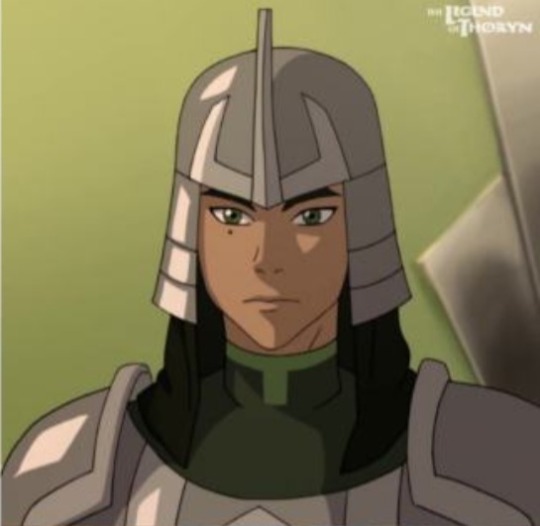
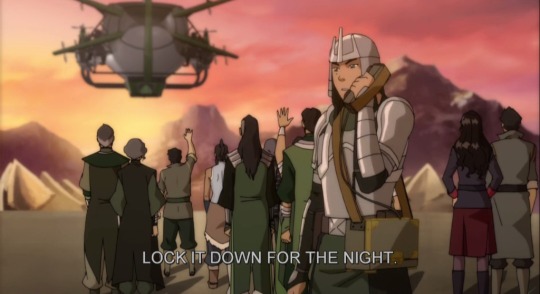
Our dashing captain of the Zaofu guard
We found out through Suyin that Kuvira rose through the ranks quickly, and from what we could infer from book 3, she successfully performed the duties of leader of the Zaofu Guard, fulfilling and even exceeding expectations due to her youth. Despite her meteoric rise, she had the support of her troops, something that came into play in unexpected ways for Suyin when they decided to follow Kuvira in her effort to retake and bring order back to Ba Sing Se. One thing that might've helped in fostering cohesion among Kuvira and her troops is the fact that despite having been taken by the Beifongs, she wasn't one of them, so her colleagues could see her as one of them. After all, she had risen from their ranks, and after her promotion, she had insisted she wanted to continue to train with them, making a departure from what was customary and what was initially taken as a breach of proper officer behavior. Instead of exclusively at the officers' table, she would walk around the mess hall and choose a random table to eat among the troops during meal times. This allowed her to listen to them and gauge their morale, showing that despite her sudden promotion, she still found their support and feedback valuable. With time, the guards noticed how some of their suggestions were taken into effect, cementing the impression that their commander paid attention to what they had to say.
Given her success and the positive feedback from both troops and officers alike, Kuvira continued implementing this practice until her army and her goals were too large to make it feasible. However, whenever she stopped at a local garrison during her travels, she always sought to make time to join the troops at dinner to get to know the men and women who were aiding her in her goal of uniting the Earth Kingdom. By doing this, she continued to inspire her soldiers, earning their loyalty, for better or worse, as the idealistic captain who left Zaofu with lofty goals became a power-hungry dictator with an iron grip and an ambition that led her to her eventual downfall.
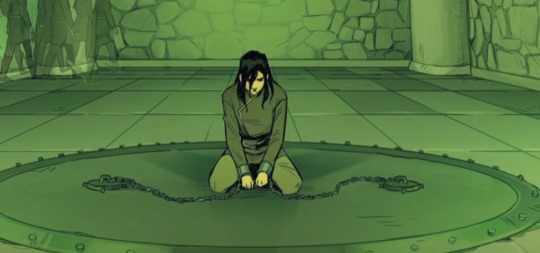
#the legend of korra#legend of korra#tlok#lok#kuvira#captain kuvira#headcanon#zaofu#going back to my blorbo for inspiration#character analysis#meta analysis
22 notes
·
View notes
Text
my thoughts on aang, morality and the role of the avatar in atla and korra
i don't think aang is a bad character by any means i really quite love how he's written he has very believable flaws and a lot of complexity/depth to him, i think i'm just personally biased to like 'spiritual' and 'holy' type characters. i am actually so glad that the series and also korra explored the flipside of spirituality with tenzin's character and how spirituality is used sometimes to bypass trauma and as a crutch for one's own personal shortcomings. also how kya II and bumi get to see aang as a more complex and flawed character through the lens of him being a less than perfect father.
the show touched on this a lot with aang's internal struggles with forgiveness vs. justice, and how much it tore him up. as if anything the avatar or any other character faces in the show is morally easy and black and white. and i also think that the caveat is the morality of the show is not easily translatable to real life situations especially real world politics, in which people get killed all the time. we also don't have bending in the real world and we do not have the option to non-violently navigate the world or to not have violence or abuse thrust upon us when we seek justice as aang did with ozai during sozin's comet. one thing aang had to learn the hard way as we do in this world is that you can't just avoid and run away from your problems all the time.
also another thing i think of a lot is how real world history and the world history of the four nations in canon cannot be viewed through a 'great man of history' lens... i.e. you cannot believe that great leaders or the avatar are the sole makers of history without the context of what was going on in society, politics and the economy at the time. idk i kind of think of the avatar as like the nuclear bomb of the world, the spirits' way of having 'mutually assured destruction' against humans who throw the world out of balance. but is just one and not the most important way of achieving balance and stability.
and speaking of balance and stability i just watched beginnings 1 & 2 in lok season 2 and loved the backstory of the first avatar wan, it really shows you how the avatar in general was just like a historically contingent figure who happened to be needed in the context of total world war and domination by vaatu. wan himself didn't want to be above others, and i don't think any avatar wants or claims to be (unless a dark avatar such as unalaq or one who is severely undertrained and unbalanced), however the people tend to see them as such. idk anyway this post is over just wanted to type up some disjointed thoughts i had ab lok and atla
#atla#lok#legend of korra#avatar the last airbender#aang character analysis#aang#avatar#four nations#wan the first avatar#thoughts
23 notes
·
View notes
Text
I'm not mad at Katara for talking about how the fire nation killed her mother, I'm disappointed she doesn't learn her lesson.
EVERY SINGLE TIME she tells anyone about her mothers death, it blows back in her face or Sokka's.
Haru. Jet.. I'm sure there's more. But I'm very sleeby (I don't mean Haru, I meant Hama, autocorrect)
Jet tried to make her angry enough to destroy a whole village with little kids and innocent people in, he tried to manipulate her.
So fucking many people use that VERY PERSONAL INFORMATION to incite anger and hatred.
Need to say this first. I DO NOT SHIP ZUTARA
The only person not to use this information against her is Zuko. Even as the morally questionable boy he is, he doesn't use that information against her.
#avatar#katara#Aang#Zuko#Avatar analysis?#avatar aang#kataang#Haru#Jet#ATLA#avatar the last airbender#Lok#i am very sleeby and atla is my comfort show
74 notes
·
View notes